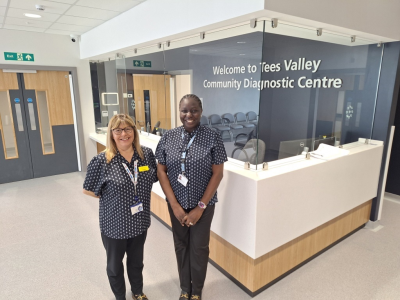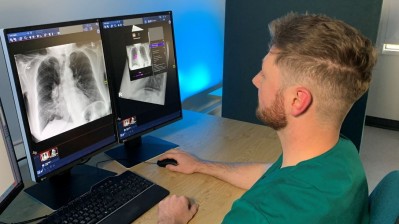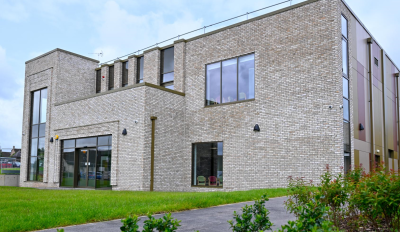In 2024/25, Community Diagnostic Centres (CDCs) across the region delivered 31.8% more tests than the previous year - an increase of 241,194 tests. This growth is helping to reduce waiting times and meet rising demand.
- Metrocentre CDC (opened October 2024): A £18.6 million joint project between Gateshead Health NHS Foundation Trust and The Newcastle upon Tyne Hospitals NHS Foundation Trust. Located in a busy shopping centre, it offers scans, blood tests, and heart and lung checks. Over 130 new jobs were created.
- Tees Valley CDC (opened April 2025): This £24.4 million investment, led by University Hospitals Tees is part of a wider plan to improve health services in the area, supported by spoke sites in Hartlepool, Redcar, and Northallerton.
- Workington CDC (opened July 2025): The new Community Diagnostic Centre in Workington, delivered by NCIC as part of a £19 million initiative that brings vital diagnostic services closer to home. This will help patients access tests like MRI and CT scans without needing to travel to hospital sites.

Looking ahead:
- Metrocentre CDC will expand with up to £8.7 million in new funding to increase capacity even further.
- Tees Valley CDC has also received £1.5 million for further development.
CDC teams have also applied for funding to introduce new services, including audiology, liver surveillance and sleep assessments.
These centres are helping patients get faster diagnoses, closer to home and often in just one visit.
The North East and North Cumbria Integrated Care System (NENC ICS) is working to make diagnostic services better for everyone. This means improving how test results are reported and shared across hospitals.
What’s been done so far
Since 2022, the programme has:
- Bought new scanners so labs can look at slides on a computer instead of under a microscope.
- Provided laptops and monitors so doctors can work from anywhere.
- Created a shared system for looking at pathology results.
- Made it easier to access X-rays and scans from any hospital in the region.
- Used AI (artificial intelligence) to help spot problems in chest X-rays faster.
- Built a strong network so hospitals can send and receive information safely.
What’s coming next
From 2025/26 onwards, the programme will:
- Replace old lab systems with new ones that work across hospitals.
- Continue sharing pathology and radiology reports across the region.
- Create one system for ordering and viewing test results.
- Help doctors choose the right test with a new decision tool.
- Build dashboards to help plan services and reduce waiting times.
How this helps
|
Who |
What it means |
|
Patients |
Quicker results, fewer repeat tests, same high-quality care wherever they go |
|
Doctors |
Easier access to test results, less paperwork, better teamwork |
|
Hospitals |
Shared systems, lower costs, fewer problems with old equipment |
|
The ICS |
Better planning, more use of new technology like AI, and stronger regional links |
A new way of working
This programme is not just about new computers. It’s about making sure all hospitals work together as one team. It supports NHS plans to improve care and use technology to help patients and staff.
For a more in-depth insight about our Digital Diagnostics programme, click here.
In 2024/25, the North East and North Cumbria (NENC) Diagnostic Imaging Network continued to improve access, quality and efficiency in imaging services across the region. All NENC providers worked together to deliver key projects.
A major success was the rollout of an Artificial Intelligence (AI) tool to help detect lung cancer from chest X-rays. This was introduced across seven Trusts, thanks to a joint funding bid. The AI technology flags possible signs of cancer early, helping doctors make faster and more accurate decisions. It also supports efforts to reduce missed diagnoses and improve cancer waiting times.

"The rollout of AI for chest X-rays has been a real breakthrough. It’s helping us spot potential cancers sooner and giving clinicians more confidence in their decisions."
The Network also focused on growing and supporting the imaging workforce:
- A new group of clinical educators helped expand student placements, adding 354 extra hours per week across eight Trusts.
- A regional workforce strategy and recruitment plan were launched to support staff development and retention.
- To help staff grow their skills, a new CPD and education plan was introduced, with a full calendar of training events. Delivery of the plan is enhanced by the Imaging Academy who are supporting the multi-professional workforce in areas such as radiographer reporting, interventional nursing, paediatric sonography and research.
- Peer support groups and specialist interest groups were also set up to encourage shared learning and
consistency across Trusts.
On the digital side, the Global Worklist project is helping Trusts share imaging more easily. Three Trusts are already live, with more joining soon. This will speed up access to images and allow for second opinions across the region.
Looking ahead, the Network is preparing to launch the iRefer clinical decision support tool and further increase student placement opportunities. Plans are also underway to host a regional career promotion event and a research conference in September 2025, both aimed at strengthening workforce development and showcasing innovation across the region.
The North East and North Cumbria Endoscopy Network made strong progress in 2024/25. A major new unit in North Cumbria opened in Spring 2025 and other NENC Providers have upgraded their facilities. More units are now JAG accredited, with units in South Tyneside and Sunderland this year recognised by the Royal College of Physicians as operating some of ‘the highest standards seen in the UK’.
The Northern Endoscopy Training Academy (NETA) continues to grow. It has reduced training times and improved skills for doctors, nurses and admin staff. National funding supported three advanced training posts and new programmes were launched to support admin and clerical teams.
A digital strategy was introduced to improve data sharing and booking systems. Plans include a shared dashboard and tools to help patients prepare for procedures. In the year ahead, the network will focus on completing the bowel cancer screening rollout and developing a networked approach to delivering Endoscopic Retrograde Cholangio Pancreatography (ERCP) and Endoscopic Ultrasound (EUS) services. This aims to ensure more coordinated care and equal access to services across all providers.

New £15m state-of-the-art Endoscopy Unit at the Cumberland Infirmary in North Cumbria


